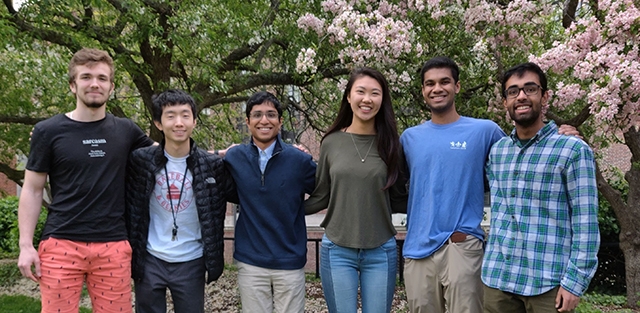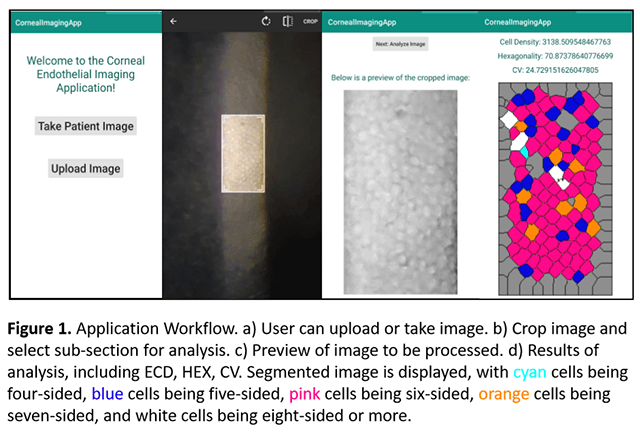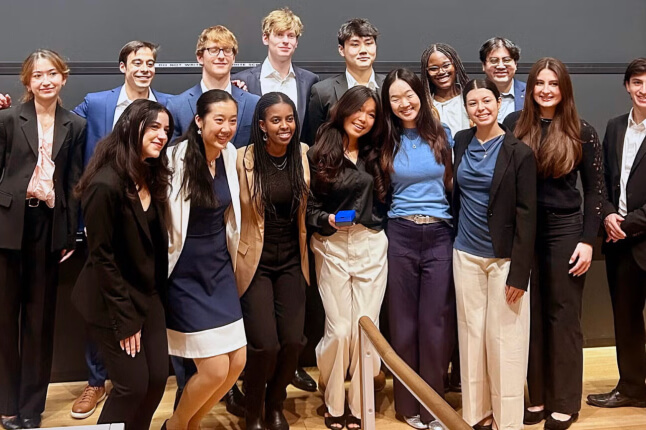News
Startup co-founders (from left) Eryk Pecyna, Andrew Zhang, Sreekar Mantena, Annie Miall, Sohan Kancherla, and Jay Chandra want to use technology to bring vital medical care to rural communities around the world.
Health care resources in low- and middle-income countries are often concentrated in urban areas, which puts medical treatment out of reach for millions of impoverished individuals who live in distant towns and villages.
A group of Harvard students have launched a startup that uses technology to bring vital medical care to those rural communities. The Global Alliance for Medical Innovation, a startup spun out of the eponymous student club at the John A. Paulson School of Engineering and Applied Sciences (SEAS), won the gold medal in the social track of this year’s i3 Innovation Challenge, sponsored by the Technology and Entrepreneurship Center at SEAS.
The GAMI team developed a smartphone attachment and software package that enables a physician to analyze a patient’s corneal endothelium tissues.
“By specifically focusing on affordability and portability, we are able to bridge the gap between that disparity in access for those in more rural communities,” said Annie Miall, A.B. ’22, a history of science concentrator. “The technology that we’ve developed replaces what physicians would normally use, which are large microscopes that cost a ton of money and are hard to bring to these rural areas. Usually, the only patients who go to these hospitals who aren’t from the city have much more severe conditions because they wait until the last possible minute because of the huge obstacles in even being able to receive treatment or diagnoses.”
The attachment they developed allows a standard smartphone camera to take detailed images of a patient’s eyes. The software analyzes that captured image to automatically approximate the number of endothelial cells and their density, which helps a physician diagnose Fuchs’ dystrophy, a disease that causes gradual malfunction of the corneal endothelium.
In Fuchs’ dystrophy, as the density of endothelial cells decreases, the cornea loses its transparency, which leads to blurry vision. Tiny blisters may also develop on the cornea; these blisters can burst and cause eye pain.
The team has prototyped the hardware and software pieces, and is now working with a partner hospital in India to test their device. After that clinical validation phase is complete, they plan to use the i3 Innovation Challenge grant to begin mass-deploying their device in low-resource hospitals.
As they’ve worked to get the startup off the ground, they’ve relied on many Harvard resources, from the 3D printers they used to prototype the device to mentors at the Harvard Business School and Harvard Medical School who weighed in on their business plan.
“One of our biggest challenges is focusing on how we are going to be a sustainable organization. We want those in low-resource communities to receive this software at a low cost, but at the same time, we need our organization to be sustainable so it can build on itself and grow at a larger scale in the future,” Miall said.
They are continuing to wrestle with that challenge as they work through a complex clinical validation process and keep their eyes out for other potential projects. As they plan for future growth, GAMI is seeking to partner with other universities to bring on additional team members who are passionate about using technology to bring health care to those in need.
Despite the many challenges ahead, Miall feels gratified to be able to help people in low-resource communities.
“What really drew me in at first was the mission to do meaningful work in the realm of creating these tech solutions using the resources we have right now, as college students, and then be able to help those who might not necessarily have the same sort of privileges that we do,” she said. “This work is really allowing us to make the most of our time here at Harvard.”
Topics: Entrepreneurship, Student Organizations
Cutting-edge science delivered direct to your inbox.
Join the Harvard SEAS mailing list.
Press Contact
Adam Zewe | 617-496-5878 | azewe@seas.harvard.edu




